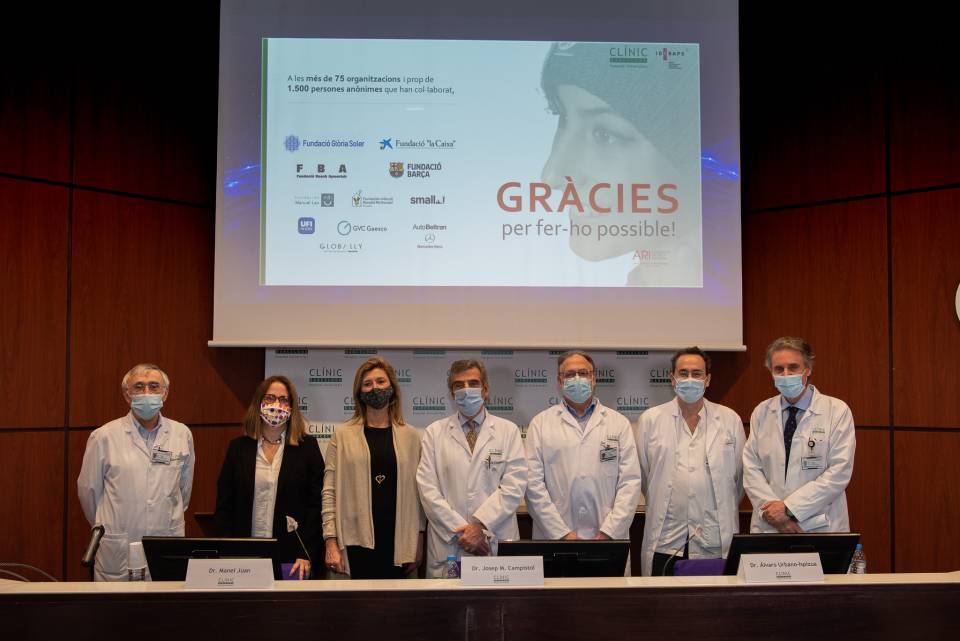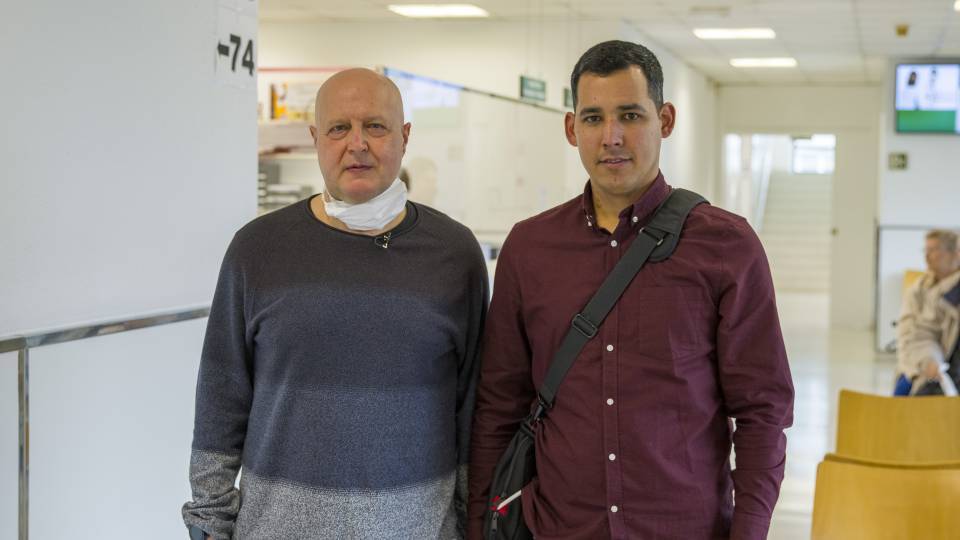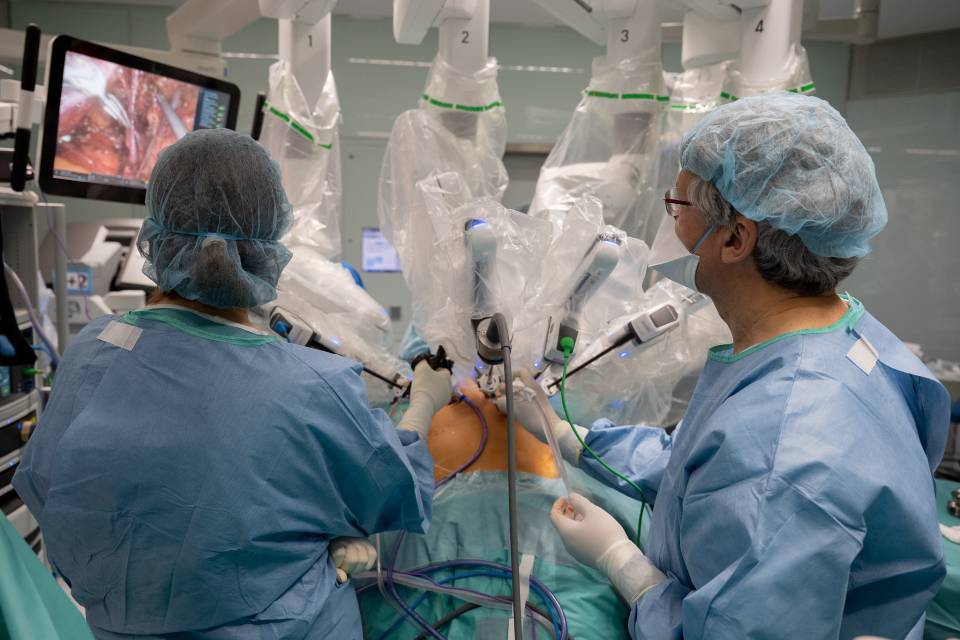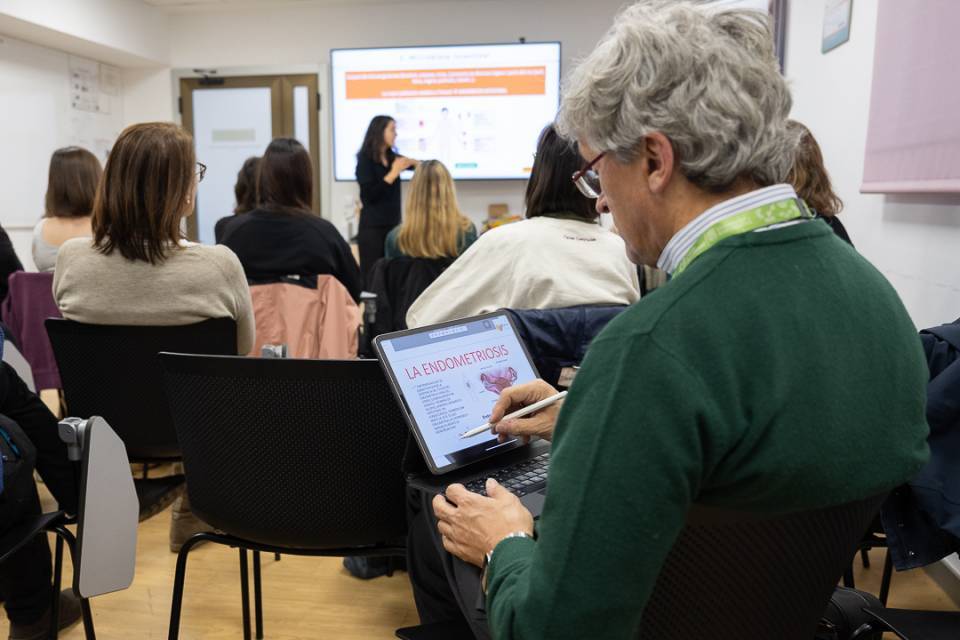Exceptional authorisation of use being granted by AEMPS is a milestone in Spain, as it is the first treatment using genetically modified cells to achieve this.
It was explained today at a press conference by Dr Josep M. Campistol, General Director of Hospital Clínic; Dr Álvaro Urbano-Ispizua, Director of the Clínic Institute of Haemato-Oncological Diseases; Dr Manel Juan, Head of the Immunology Department at the Biomedical Diagnostic Centre (BDC) at Hospital Clínic and head of the joint platforms at Hospital Sant Joan de Déu and the Blood and Tissue Bank; Dr César Hernández, Head of the Department of Medicines for Human Use at AEMPS; and Dr Xènia Acebes, Director of the Care Area at the Catalan Health Service (CatSalut).
Dr Josep M. Campistol commented that, “Reaching this point was possible thanks to the joint efforts of many professionals and researchers at the hospital who have participated in the various stages of development of the treatment, from fine-tuning the CAR-T to conducting the trial to demonstrate its efficacy. In addition, we were driven by society, through the ARI Project, to make this project a reality, reflecting the Clínic's vocation to offer our patients the most innovative treatment options”.
Dr. César Hernández noted that "the authorization for use granted based on this legislation on advanced therapy drugs of non-industrial manufacture must allow both the access of patients who have no other treatment alternatives and continue to generate knowledge about the drug so that, eventually, a centralized release authorization can be obtained for the whole of Europe."
Dra. Xènia Acebes points out that, "with the hospital usage exemption of CAR-T ARI 001, it is clear that the Catalan Health System is at the forefront of advanced therapies. The results have been achieved thanks to the collaboration between institutions and their teams' perseverance, making it possible to develop and authorize this therapy for a severe niche pathology. The Catalan Health System is strongly committed to developing innovative treatments. For advanced therapies' growth in Catalonia and also for other CAR-Ts that may occur in our country".
A CAR-T developed with own molecules
CAR-T (Chimeric Antigen Receptor T-Cell) is a type of cell and gene therapy in which the patient becomes their own donor. It involves modifying the patient's T-lymphocytes so that they are able to attack tumour cells. “In our case, the CAR-T was developed using our own antibody that was created at the hospital more than 30 years ago, and for which we have now found a new application,” explains Dr Manel Juan.
T-lymphocytes, a type of white blood cell responsible for immune response, are obtained by apheresis, a technique that allows blood components to be separated. They are genetically reprogrammed so that, when transfused back into the patient, they can specifically recognise and attack tumour cells. The patient's response can already be observed after three weeks.
In order to make this treatment available to patients, a team led by Dr Manel Juan developed a new CAR-T CD19 using their own monoclonal antibody to modify T-lymphocytes. Preclinical studies showed that CAR-T ARI-0001 was able to completely control disease progression in animal models, and that its efficacy was similar to that of the other CAR-Ts available. “The preparation method used to obtain our CAR-T is robust and reproducible and allows us to lower the cost of producing the therapy to make it affordable for academic institutions, and available to all patients,” says Dr Juan. “This project involved a multidisciplinary team of more than 175 professionals, and was made possible thanks to the Clínic-IDIBAPS’s research tradition and the availability of the infrastructure necessary to develop a treatment of this sort,” he adds.
A clinical trial to treat patients with no other therapeutic options
Acute lymphoblastic leukaemia (ALL) is one of the four main types of leukaemia, and is characterised by an excessive production of immature lymphocytes, or white blood cells, which multiply rapidly and displace normal cells in the bone marrow. Although in most cases complete remission is achieved with chemotherapy or bone marrow transplantation, 10-15% of patients die due to treatment resistance, toxicity or relapse. Once treatment options have been exhausted, less toxic and more targeted solutions are needed, in which immunotherapy can play a key role.
The trial, led by Dr Julio Delgado from the Haematology Department at Hospital Clínic, and Dr Susana Rives, from the Haematology Department at Hospital Sant Joan de Déu in Barcelona, was launched in July 2017. The study included 58 adult and paediatric patients. Of these, 38 patients with ALL were treated with the CAR-T developed at Hospital Clínic. All patients had received several lines of treatment and the vast majority had received a bone marrow transplant. Therefore, these patients had no other therapeutic alternatives available.
CAR-T infusion and subsequent patient management was performed at the haematology departments of both hospitals. The patients remained on the haematology department wards so that toxicities associated with the effect of CAR-T could be monitored. Some patients had to be transferred to an Intensive Care Unit.
The trial results demonstrate that CAR-T ARI-0001 produces a complete response in more than 70% of patients, meaning that no residual disease remains. As Dr Álvaro Urbano-Ispizua explains, “Our CAR-T is safe and highly effective, with results comparable to those described for other CAR-T therapies”. “This CAR-T fills an unmet need for the treatment of patients with ALL, in particular for adult patients who are refractory to available treatments, and for whom there was no other option,” he adds.
“The fact that we produce it at our own hospital means we can prepare it in very little time, which is essential given the fragility of many of these patients. In addition, we can tailor the treatment according to the patient’s characteristics. Moreover, by having the product in our hands, we can modulate the amount of CAR-Ts to be administered, or repeat the dose if necessary,” says Dr Urbano-Ispizua.
Dr Gonzalo Calvo, Head of the Clinical Pharmacology Department of the Medicines Area at Hospital Clínic, led a group of professionals from his department who were responsible for preparing the dossier for the application for approval, and maintaining the necessary dialogue with AEMPS to resolve any queries raised by the regulatory body. Dr Calvo comments that, “The evaluation of CAR-T ARI-0001 carried out by AEMPS was done in accordance with European regulatory standards and guarantees that Hospital Clínic's CAR-T is a medicine that meets the quality, safety and efficacy criteria required in our field”.
The ARI Project: the driving force behind CAR-T at Hospital Clínic
The ARI Project emerged thanks to the dream of Ari Benedé, a girl diagnosed with ALL who passed away on 2 September 2016. She and her mother, Àngela Jover, launched this project, based on two lines of action: research, focused on the implementation of CARs at Hospital Clínic, and care, with the aim of improving home care for oncology and haematology patients. “It all began with the ARI Project. Not only the necessary financial resources, but also motivation, enthusiasm and teamwork. We will always be indebted to Ari," says Dr Urbano-Ispizua.
The ARI Project raised close to 1.8 million euros from companies, foundations, associations and individuals.




